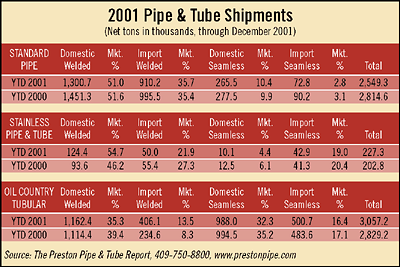
President Bush's March 5 announcement of steel import relief granted tariffs of 13% on carbon and alloy fittings and flanges, declining to 10% in year two and 7% in the third year. Relief also was granted for certain welded tubular products (other than oil country) of 15%-12%-9% over three years. The remedies were less than those recommended by most of the International Trade Commission.
The President granted no relief to the stainless steel fittings and flanges category, despite recommendations from three of the six ITC commissioners to do so. The ITC earlier turned thumbs down on injury claims for seamless carbon and alloy pipe, seamless and welded oil country tubular goods, and both seamless and welded stainless steel pipe.
Scores of "developing countries" had their imports excluded from the remedies, with exceptions granted to India, Romania and Thailand for carbon flanges, and to Thailand for welded pipe.
Clay Tyeryar, executive director of the American Pipe Fittings Association, called President Bush's decision "a step in the right direction, but it's not a long-term solution to our problems." His lukewarm assessment was in the mainstream of industry opinion sampled by Supply House Times.
"I expect we'll see a steel price increase soon," commented one PVF wholesaler we spoke with at the recent SWA Convention. A pipe manufacturer there said he couldn't tell what the impact would be until the final regulations were written. "They've got so many exclusions written into the document, it's hard to tell what's going on," he said.
America-first sentiment was voiced in some quarters. Dennis Lehman of Miami's Lehman Plumbing & Pipe Supply said, "The tariffs should have been 30%. Let (the foreigners) retaliate. We need to save American steel jobs."
Weldbend's CEO James Coulas Sr., said the 13% tariffs granted to his product categories "won't do us any good." Even more than pricing issues, Coulas was disturbed by what he described as inferior goods being imported from overseas. "I'm truly afraid that someday there will be lives lost due to failures of foreign fittings and flanges."
The ITC has authority to launch investigations under Section 201 (Global Safeguard) of its charter when increased imports of a product are alleged to be "a substantial cause of serious injury, or threat of serious injury" to a U.S. industry. Global Safeguard investigations do not require the finding of an unfair trade practice; however, finding injury under Section 201 is considered to be more difficult than those of the unfair trade practices statutes.

